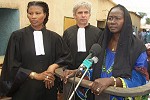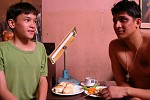 Arthouse films ’06
Arthouse films ’06THE BLOSSOMING OF MAXIMO OLIVEROS | BUENOS AIRES, 1977
< < M O R E | M O R E > >
last update 16.Oct.06
See also: SHADOWS FILM FESTIVAL | SHORT FILMS
 R E V I E W B Y R I C H C L I N E
R E V I E W B Y R I C H C L I N E
 MUST-SEE
MUST-SEE
 This powerful film is a complex expression of Africa's heart and soul in the face of unspeakable global injustice. It may be conceptual and a bit mannered, but it's also moving and essential.
This powerful film is a complex expression of Africa's heart and soul in the face of unspeakable global injustice. It may be conceptual and a bit mannered, but it's also moving and essential.
In Bamako, the capital of Mali, the bar singer Melé (Maïga) and her out-of-work husband Chaka (Traoré) are struggling with their marriage even as, in the courtyard of their home, a trial gets underway in which African society accuses the World Bank of jeopardising lives. As witnesses give testimony and lawyers present their cases, Melé begins to care about what's happening, even as Chaka and his friend (Dembélé) start to lose interest--and hope.
Writer-director Sissako (Waiting for Happiness) films this like a documentary with added shades of irony and black comedy. Characters jostle with cameras and microphones as journalists broadcast the trial to the city. The testimony is startlingly matter-of-fact, firsthand observations by educated people who see their world crumbling due to unfair oppression from the West. The raw facts and figures are delivered with such emotion that we quickly understand that we're dealing with pauperisation, not poverty.
The West's banking systems (including debt cancellation), designed to assist developing nations, actually only help the rich feel better about plundering the world. While in poorer countries, easily treatable diseases become epidemics, life-spans are falling and illiteracy is rising. This is directly linked to such impositions as enforced privatisation of utilities, healthcare, transportation and education. And when the West talks about corruption, they're confusing causes and consequences (and pointing out a splinter in their neighbour's eye when they have a plank in their own).
The lament goes, "Why don't I sow? When I sow, why don't I reap? When I reap, why don't I eat?" Yes, this is strong stuff, but spoken in an articulate, measured, passionate West African voice, it's impossible to ignore. The legacy of European colonisation lives on in this crushing "neo-colonialism". As a film, this is expertly written, performed and edited--complete with a Sergio Leone-style cowboy interlude (starring Glover) that intriguingly offers to share the blame. Humanity's future is at stake here. And during the debate life goes on.
with Aïssa Maïga, Tiécoura Traoré, Hélène Diarra, Habib Dembélé, Aissata Tall Sall, William Bourdon, Roland Rappaport, Mamadou Konaté, Zegué Bamba, Aminata Traoré, Madou Keita, Georges Keita, Danny Glover, Elia Suleiman, Dramane Bassaro, Zeka Laplaine
 release US 16.Feb.07,
release US 16.Feb.07, UK 23.Feb.07
06/Mali 1h55
CANNES FILM FEST
TORONTO FILM FEST

16.Oct.06 lff
 R E V I E W B Y R I C H C L I N E
R E V I E W B Y R I C H C L I N E Au delà de la Haine
Au delà de la Haine
 With a strongly emotional punch, this simple documentary addresses issues of reconciliation, forgiveness and revenge from a deeply personal perspective.
With a strongly emotional punch, this simple documentary addresses issues of reconciliation, forgiveness and revenge from a deeply personal perspective.
The film begins two years after Jean-Paul and Marie-Cecile Chenu lost their son François, beaten to death by three skinheads for being gay. Over the course of the film, director Meyrou follows the Chenus as they and their other children talk about the horrible event, talk with lawyers and journalists, and prepare to have wounds reopened during the trial. They want to move beyond the hatred and violence they feel toward the murderers. They want to understand why it happened, and take positive action. "I'd like to have retained my anger forever, but I can't," Marie-Cecile says.
As the trial progresses, it emerges that the attackers were normal young guys (one was a minor), fuelled on alcohol and by their racist, nationalistic group dynamic. They went out that night to "kill an Arab", but decided that a gay man would do. "They think they have the right to kill an Arab or homosexual," says one lawyer.
The film is extremely straightforward. Meyrou's camera is unobtrusive and observational, catching private conversations and intimate moments. There's a lot of talking--constant double-line subtitles (by the end we feel like we've read a book!). The images, though, are minimal: faces of survivors, hallways outside the courtroom, the place where the attack happened, a candlelight vigil on a bridge nearby. The film's main flaw is that there's no sense of François here; we never know anything about him besides that he was open about who he was and he bravely refused to accept this injustice. That he stood his ground, one against three, and called them cowards was inconceivable to his attackers.
Even though it's profoundly low-key, the film is riveting. Watching this resilient family struggle to find a constructive path is deeply inspirational, especially when faced with the ignorant conjecture of journalists and others. The film's opening line is Jean-Paul saying, "It's a failing of the society I live in"; they're calling for more tolerance and better education. And in the film's coda, six months later, the Chenus deliver a message to their son's convicted killers that's astonishingly compassionate and moving.
with Jean-Paul Chenu, Marie-Cecile Chenu

release Fr 2.Jul.06,
UK 30.Mar.07,
US 15.Jun.07
05/France 1h26


18.Oct.06 lff
 R E V I E W B Y R I C H C L I N E
R E V I E W B Y R I C H C L I N E
Ang Pagdadalaga ni Maximo Oliveros
 Superb evidence that the digital revolution is changing the playing field, this engaging feature from the Philippines deserves to be seen by wide audiences interested in other cultures.
Superb evidence that the digital revolution is changing the playing field, this engaging feature from the Philippines deserves to be seen by wide audiences interested in other cultures.
Maximo (Lopez) is an effeminate 12-year-old who's simply accepted by his family of small-time macho crooks--dad Paco (Cruz) and big brothers Boy and Bogs (Sese and Medina). After their mother's death, Maximo manages the home in a Manila slum, covering for the "men" as they sell contraband for a living. Then Maximo befriends the young cop Victor (Valentin), who starts to teach him right from wrong. And suddenly Maximo has a crisis of conscience, complicated by his crush on Victor. And the fact that the new police chief (Pascua) is cracking down on crime.
This isn't a slick film--it's shot like a documentary with handheld cameras, live sound and extremely real people who interact naturally (and sometimes struggle with more dramatic scenes). But it's packed with skill, as director Solito shoots with long takes that make the most of the earthy setting. It's like a low-budget City of God, with kids who have grown up in a violent place, and find that it feels like home.
The opening scenes with the father and his three sons are lively and funny, as the brothers tease each other and interact with neighbours and friends. Maximo becomes especially endearing, staging flamboyant production numbers and openly befriending everyone he meets. The violent assault that shifts the film's tone is also the catalyst for the main plotline. And things do get intensely serious. Although even here, Solito keeps the rhythms and pacing in check, maintaining a sense of authenticity.
Overall, the film is somewhat awkward and slow, but it's also such a fascinating voyage right into the middle of this culture that it's well worth seeking out. The film takes a strikingly honest look at arrogant masculinity and the lingering effect of even a minor crime. So it's all the more emotionally powerful in a place like this, where finding someone to trust--even the most unlikely person--can turn a life around.
scr Michiko Yamamoto
with Nathan Lopez, JR Valentin, Soliman Cruz, Ping Medina, Neil Ryan Sese, Bodjie Pascua, Pepe Smith, Peter Anthony Tombasa
 release US 22.Sep.06,
release US 22.Sep.06, UK 1.Jun.07
05/Philippines 1h38
Teddy Bear Winner:
BERLINALE


12.Oct.06 lff
 R E V I E W B Y R I C H C L I N E
R E V I E W B Y R I C H C L I N E Crónica de una Fuga [aka Buenos Aires, 1977]
Crónica de una Fuga [aka Buenos Aires, 1977]
 Based on courtroom testimony, this harrowing drama dares to dig well under the surface of the oppressive regime in 1970s Argentina, when people regularly disappeared from the streets, kidnapped by their own government. It's a little over-serious, but it's also very timely.
Based on courtroom testimony, this harrowing drama dares to dig well under the surface of the oppressive regime in 1970s Argentina, when people regularly disappeared from the streets, kidnapped by their own government. It's a little over-serious, but it's also very timely.
Claudio (de la Serna) is a professional football player who's snatched from the street by ruthless (and thieving) secret service cops. He's taken to an isolated mansion, brutally questioned and held indefinitely, even as he protests his innocence--and the man (Urruty) who named him admits he lied. Claudio eventually gets to know his fellow prisoners (Casero, Delgado, Marmorato) and guards (Echarri, Alonso), and realises he's unlikely to ever see his family again. And they discover that it's rather difficult to escape when you're held in an upstairs room, tied to a bed, stark naked.
Director-cowriter Caetano tells this story in a bracingly straightforward way, free of any flourishes or Hollywood cop-outs. We simply endure this ordeal alongside Claudio, down to the most menacing details. It's a scruffy and earthy filmmaking style, with apparent continuity errors as clothing appears and disappears--or perhaps this is denoting a passage of time. It's startling for us to feel how the lives of these young men just stop in their tracks.
The actors throw themselves into these roles with restrained performances that centre on the inner life of the characters. The film may lack the overwrought set pieces of big-budget movies about imprisonment and persecution, but by keeping things internal it allows the cast to catch telling personal details that make the whole experience much more intimate. This isn't a film about relentless abuse, it's about the survival of the human spirit.
This is a remarkable, gruelling tale that never abandons hope. As a film it's engaging and gripping, although strangely lacking in real-life nervous humour. But as it progresses, it catches us on another level that's even more relevant, forcing us to ask how we can ever feel safe if our government declares that it's above the law.
scr Adrián Caetano, Esteban Student, Julian Loyola
with Rodrigo de la Serna, Nazareno Casero, Lautaro Delgado, Matías Marmorato, Pablo Echarri, Diego Alonso, Martín Urruty, Guillermo Fernández, Leonardo Bargiga, Alfonso Tort, Julián Krakov, Daniel Di Biase

release Arg 24.Mar.06,
UK Oct.06 lff,
US 30.Nov.07
06/Argentina Fox 1h43
CANNES FILM FEST
TORONTO FILM FEST

6.Oct.06 lff


See also: SHADOWS FILM FESTIVAL | SHORT FILMS
© 2006 by Rich Cline, Shadows
on the Wall